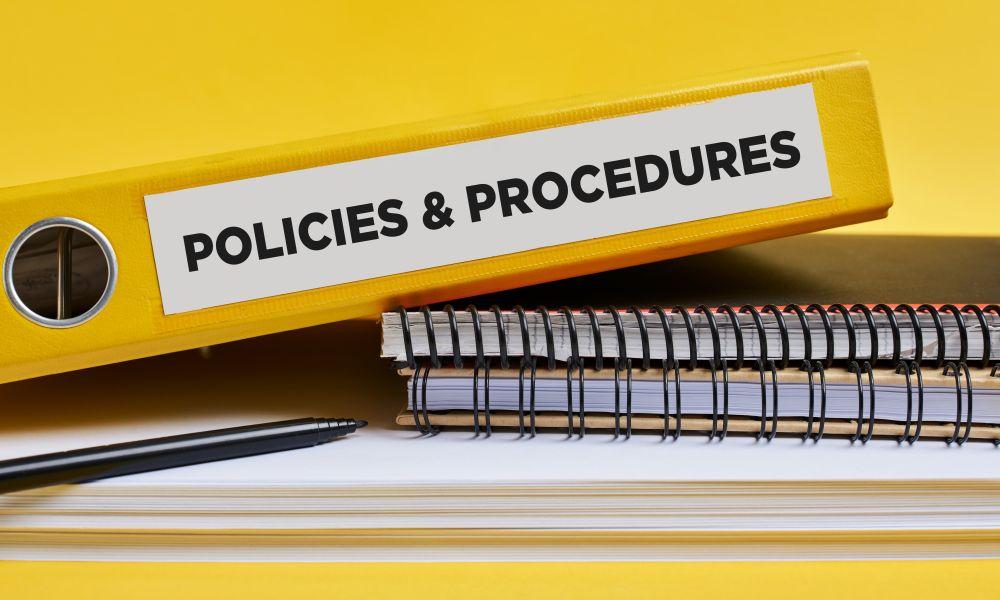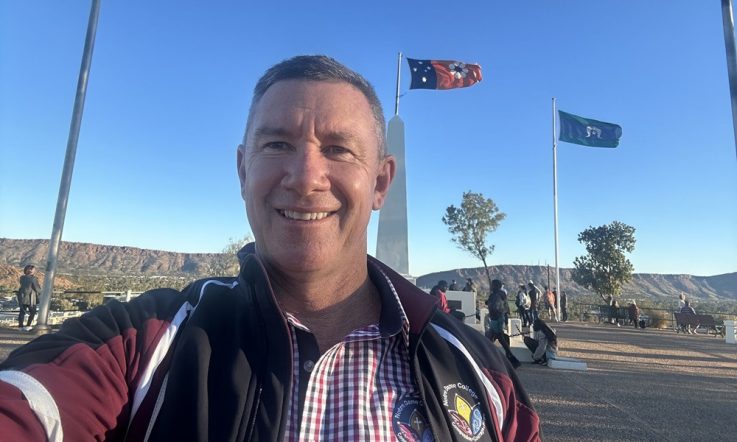Before we get into this episode, if you’re new to the profession in 2025 or just new to Teacher magazine, did you know there’s a whole host of free content on the teachermagazine.com website. There are thousands of articles, infographics, videos and podcasts (including transcripts of all our episodes from all our series) in our archive – all online, all open access, and we publish fresh content throughout the week.
Hello, thanks for joining me for this Teacher podcast – I’m Jo Earp. School Assembly is the series where we find out what it takes to build a new school from scratch. We’ve been following Dan McShea from Notre Dame P-12 College on Queensland’s Sunshine Coast since the middle of last year, hearing about the role of Foundation Principal and what it entails – not just in the lead-up to a new school opening, but also the first few months of operation. This is Series 3, and today we’re on Episode 8. So, the topic for this one is policies and processes. Which documents are the responsibility of the Foundation Principal? Is there a template that schools work from? Is it a different procedure for whole-school policies and subject-specific ones? These are just some of the questions we’ll be discussing as Dan gives us a glimpse into the world of strategic planning school leadership. I hope you enjoy the episode.
Jo Earp: Hi Dan, welcome to Episode 8 and the first thing I wanted to ask is how's everything going? Because it's been such a difficult time up in Queensland and NSW with ex-tropical Cyclone Alfred, I think it was eventually called and the aftermath of that. So, how are you going?
Dan McShea: Oh, look, yeah – thankfully, there was only very minimal impact here where we are, although it seemed headed straight for us at one point, some of our families were affected, as were many of our neighbouring schools. But schools in our area were closed for 2 days of what was actually reasonably fine weather. And then the harder day was actually the day we came back to school. But you know, we got through that unscathed, which was great.
JE: That's good to hear. I mean, even that kind of like anticipation and possible planning of where it may go. You know, it changes course and so on. That's super stressful, isn't it? Must be super stressful for everybody.
DM: Yeah, I think you know it has you wondering and you don't want to under prepare for something like that. And it brings back memories of other times of those sort of things, and it also brings out the best in people, I’ve found, as well. And families really value clear communication and good decisions, and they band together. So, we probably experienced all of that without any of the hardship or damage so that was great.
JE: That’s good to hear. So, we’re going to be touching on planning for scenarios like that, actually, today as part of our chat about policies. It was interesting (I had a look back) when we’ve spoken to principals in past series, they’ve said there are loads of policies and procedures for schools these days. And actually, Dr Ray Boyd at Dayton Primary in WA, his phrase was ‘truckloads’. So, let's have a chat about what's happening in your context up there in Queensland. Not just that, but as AP to 12 and not just that in the Catholic education system. How far back does that planning for policies go then?
DM: Well, you're right, there is truckloads and it does go really far back and I believe that it's important that there's a clear line of sight and alignment between all of those key documents and the Vision and Mission statements with the policy and procedural documents. So, with the opportunity to develop or refine a college mission statement and to have the chance to inform the culture of a school from the start, this actually goes way back to the to the very beginning, and often round and round in circles.
The college name, the charism and the words of the motto and the mission statement should be a golden thread through all the working documents of the school and all the procedural documents of the school. And you get that chance once, really. So, those things should drive the school, I believe. So, that's what we've attempted to do. In saying that, a lot of the policy work, which used to be completed through School Boards and individualised for schools, a lot of that heavy lifting is done by our system and there's good consistency there and good expertise there; with an opportunity or a need to contextualise those things for your own school.
JE: That's good, that's good to hear. So, you know, like you say, that heavy lifting is taken off you for some of those. What's the first key policy, then, that you're looking at as a principal? I was thinking, sticking to Ray’s vehicle-themed analogy, I’ll crowbar one in myself – the ‘first cabs off the rank’ then are they going to be the whole-school policies then, I guess?
DM: Well, I thought about this question a little bit. It seems like the tail can wag the dog sometimes, and there's several deadlines that need to be met throughout the year, and I'm talking about the year before you start your school. But a way of working document that we came up with and we named ‘The Notre Dame Way’ was (and still is) our biggest piece of work.
And that is our way of working and being; it's for staff, students and families and it consists of 25 aspirational statements that are ways of working for our people that align with our Mission, our Marist charism, and our context, and with our words of our motto – courage, compassion and hope.
And that document, those ways of working, actually inform all of our procedural documents, including our next biggest piece of work, which is our Notre Dame Education Strategy. And that document is a convergence of our beliefs about effective teaching and learning, and corresponding teacher and student commitments. And so, the strategic plan for our school this year is actually to operationalise those 2 documents.
JE: Just going back to the safety plans that we talked about earlier then. That idea of, you know, this may happen, this may happen … those big ones, those big safety plans – I'm interested, is that still a principal thing or a school leadership team thing, or you've mentioned systems, or even actually is that something that say the government or a fire authority handles – in the case of a bushfire plan, or a cyclone plan – how does that work?
DM: So, we have Critical Incident management plans that the template would come from the system, but also the expertise from the system that would work with the school to contextualise those procedures for your school. And so, there is certainly expertise. But in saying that, you know, when your school's quite small … we've only got 212 students here at the moment and 28 staff; so you've got a small number of people wearing a lot of hats, and you don't have the full-time Workplace Health and Safety Officer, you've got an external role that comes here once a week, who in our case has offered outstanding support and has done a lot of the heavy lifting with what those plans are. What the curly questions are about the child that's got the extreme anaphylaxis or to foods that are really hard to avoid, and those sort of curly questions, there is great support there for that. So, the big documents there, the context needs to come into it and the advice is there and there's ways of working to make that more manageable, more contextualised, and remain consistent, I think.
JE: Yeah. And we've talked about that many times, haven't we – context is key! And that's good that you've got that big outline, you're not sitting there thinking ‘Right, how do I put this together? What's an example?’ You've got the template, you're importing that, and then you're adding those things to it, like you say. I mean, added to that, in recent years as well you've got the pandemic, right? So that won't even have been on anybody's radar (possibly) before, but a whole new way of working potentially for schools, depending on what happens, but also the planning aspects of that. Are there clear policies for that now? Is that something that was introduced and sort of added to the list?
DM: Look, you know … I’ve only been a principal for 14 years. People would have been in the game a lot longer than me and would have seen everything, you know. Schools have always, I think, done an outstanding job of adapting to whatever obstacles are thrown at them over the years and that's part and parcel of the complexity of our role as principals.
In my time we've encountered floods and droughts. I was a deputy principal in North Queensland during Cyclone Yasi, which was a Category 5 cyclone that hit right on the town that we were in. We've had lockdowns and loss of members of communities, and all sorts of things. And I think probably during the pandemic we're actually at risk of only focusing on a critical incident – being COVID-19 – when all of those other things could, and did, still happen as well.
So, yeah, things are going to happen that we haven't encountered yet or before, or differently to what the document says, and I think if the job of being a principal was easy, I think everyone would do it. But, you know, it is a complex role, and I think it's important that people have those procedural documents there. They're your best friend. They're the place we should be going to first when things happen and they get better all the time and we need to stay current with what's happening there and rely on the support that's available and support each other as colleagues as well.
You’re listening to Episode 8 of Series 3 of the School Assembly podcast from Teacher. If you’re new to the profession, or you’ve just discovered our podcasts and Teacher magazine, I want to tell you about the additional free content on the teachermagazine.com website. You’ll find more than 3,000 articles, infographics, videos and podcasts (including all the transcripts of our episodes from all our different series) in the archive – all online and open access. And it’s also where you can sign up to our regular bulletins to get the latest content and trending topics, delivered straight to your inbox. Access all that content and sign up to the bulletin at teachermagazine.com.
JE: Just going back to the chat with Ray at Dayton, the Associate Principal there, Rachel Lehr was saying that – and it touched on what you've just said – you find out almost what you don't have in the moment with a new school. You're like, ‘oh, actually, haven't thought about this …’. So, it would be impossible to have every single thing in place, right? Obviously, the crucial ones need to be in there, and you've mentioned, you know, some of those crucial ones there – particularly around health and safety and critical incidents. But do you have sort of like a long list that you're working through as time goes on? How do you manage that? What's the most important? It's just a case of prioritising, is it?
DM: Look. Yeah, look, there's no playbook. If there is, it wasn't provided to me. And it wasn't provided to the people that have gone before me, that I've spoken to either. And so, we did have the luxury of an entire year to prepare for the commencement of our school. And I know colleagues that have set up new schools that only had a term or a semester, or even one that finished in December and started in January (that was a while ago, though).
And so, we had a great team, we were collaborative, we made the most of the time we had to set things up. But yeah, there's no playbook and there's no list, so there's a new list every week, and there's a ‘what about this?’ list, and ‘did we forget that?’ list and then you sort of hope and pray that you got everything at the end because there was an unexpected delay in, you know, things being ready when you thought they were going to be, and often you're going around in circles as the creation of one document relies on information that would be contained in the next one, or the one before that you haven't begun yet. So, you know, staff handbooks, duty rosters, duty procedures, rosters, uniform policies, traffic management plans, student diaries – all rely on each other. So, you're often working on those things concurrently and you absolutely want to make them your own because, as I said earlier, you want that golden thread running through all of your documents.
So, yeah of course there's things that you run into at the beginning of any school year that you just haven't encountered yet; the primary teacher that's got a secondary duty and it's a wet day and, you know, the traffic issue and all of those things. So, I think the advice is if anyone's listening that's about to embark on this journey, try to get staff that have initiative that are adaptable, really adaptable, number one priority, and collaborative.
JE: That's a great example there that you shared about how everything's interlinked. Just, you know, all those policies, and I'm sure there were lots that you didn't mention as well that were all reliant on that thing as well. So that's good to get a bit of context and a concrete example. And there about staff, about staff playing a role, and I guess as more specialist staff in particular come on board, too, they then take responsibility for some of those policies and processes then that don't fall into that whole school bucket, but are maybe a little bit more niche if you like?
DM: Oh look, yeah, absolutely, and they have to, you'll need them, we need them to. And there are things about the work of the Science lab or the Sports department, the Hospitality kitchen or the desirable layout of the Design Technology workshop that really are unique to that area and are reliant on that expertise. And that's why those cultural pieces like the Mission Statement, the Ways of Working documents, are really essential because they can still be contextualised for different uses in a P-12 school, and even for staff, and so there's still a consistent approach and a common language across the school, but there's that sharp expertise where you need it.
JE: Absolutely. And then of course, the other tricky part of that is making sure that everyone's aware of it. You don't want the policies and procedures sitting there and nobody ever refer to them or you … like you say, the whole point is consistency. So, you want to make sure you do that. For example, I'm thinking behaviour management policies are a kind of a key day-to-day one. And we know again about how important consistency is there. How do you keep not just the staff, but the students, the parents informed about all of these policies and processes (where they need to be, of course).
DM: This is a really big challenge Jo, and it's an ongoing one. And time is really at a premium, and staff meeting time is so precious and it's hard to get, and you can't spend copious amounts of hours going through documents line by line. And there's a fear sometimes that people actually don't read emails, or don't read them thoroughly. So, we've got to create and take regular opportunities to point things out, to live them, to show that that's how we do it, to remind people. And that's ongoing work and that's work that's going to be repeated when we have so many new staff next year and the following year and the following year. So, we've challenged our original foundation staff to be the story holders and to step up. They've got the luxury of hopefully some more time than they may have, typically, down the track, and we want to invest in their professional development and have consistency among that team. But it's hard, and it’s ongoing work that we just can't take our eyes off.
JE: I feel like this is going to play into the next 2 episodes, I think it is, before we have our final. So, we've got one on professional learning which will be, again, an interesting link and then one on distributed leadership as well, which that's kind of what you're talking about really isn't it, empowering people. OK, that’s been really interesting to get a bit of an insight about how it's all put together in terms of your context. And I feel like with most of these we could talk for another hour on this, but we're not going to, we're going to end the episode with our usual 3 questions. So, your key learning, your biggest challenge and proudest achievement since we last spoke.
DM: Proudest achievement – finally our construction is only just completed now.
JE: Yes!
DM: This week we opened up our beautiful huge playground, we opened up our Marcellin Centre, which is a big multipurpose covered 2 basketball courts and sports storage, toilet facilities. It's incredible. All of our green spaces are available, and our builders are almost gone, which is absolutely a proud moment.
Key learning has just been a reminder about the importance of collaboration with staff, accessing staff voice and having clear communication with staff and taking those opportunities.
Biggest challenge is the one we just referred to. It's time. It’s time to spend with staff to make sure your message is clear, and they still have the opportunity to do all the other things they need to do to make sure their work, their lessons are engaging, their students’ wellbeing is catered for, and their wellbeing’s attended to. So, time’s a challenge.
JE: With that in mind, then, I'm going to let you go in a minute. Well done on getting the building works complete; great that the builders have been able to do that and the team there, particularly with all the weather issues you've had there. So that's fantastic. And yeah, I'm sure all of those new facilities will be used well in the coming months. But, have a great March for now.
DM: Thanks Jo.
JE: We'll catch up again next month, and we'll talk about professional learning then.
DM: Lovely to talk to you. You have a great month and we'll see you soon.
That’s all for this episode – thanks to Dan in Queensland and thanks for joining me, wherever you are. If you do want to keep listening now there are more than 300 episodes from the last 10 years to choose from, including our Research Files series, Behaviour Management and School Improvement. Find those wherever you get your podcasts from. Hit the follow button to make sure you don’t miss out on new episodes. And please leave a rating and a review while you’re there. Bye!
The Teacher bulletin is your free, weekly wrap of our latest content – not just the podcasts, but also the articles, infographics and videos – straight to your inbox. To join more than 40,000 educators who are already part of our community click on the sign-up button at our website, teachermagazine.com.
Other episodes in Series 3:
- Episode 1: Meet our Series 3 principal
- Episode 2: Growing student enrolments
- Episode 3: Crafting a school vision and mission statement
- Episode 4: Leading a new school
- Episode 5: From building site to finished school
- Episode 6: Setting the teaching direction and a Series 1 and 2 update
- Episode 7: The first day of school
In this episode, Notre Dame P-12 Foundation Principal Dan McShea talks about the ongoing challenge of ensuring the school community, including new staff who join each year, are aware of the policies and procedures that are relevant to them.
How do you communicate important documents and action plans to staff, students and parents? Do you build in regular opportunities and reminders throughout the school year?
As a school leader, how do your policies and procedures link back to the vision and mission statement, and strategic plan for your own context?



